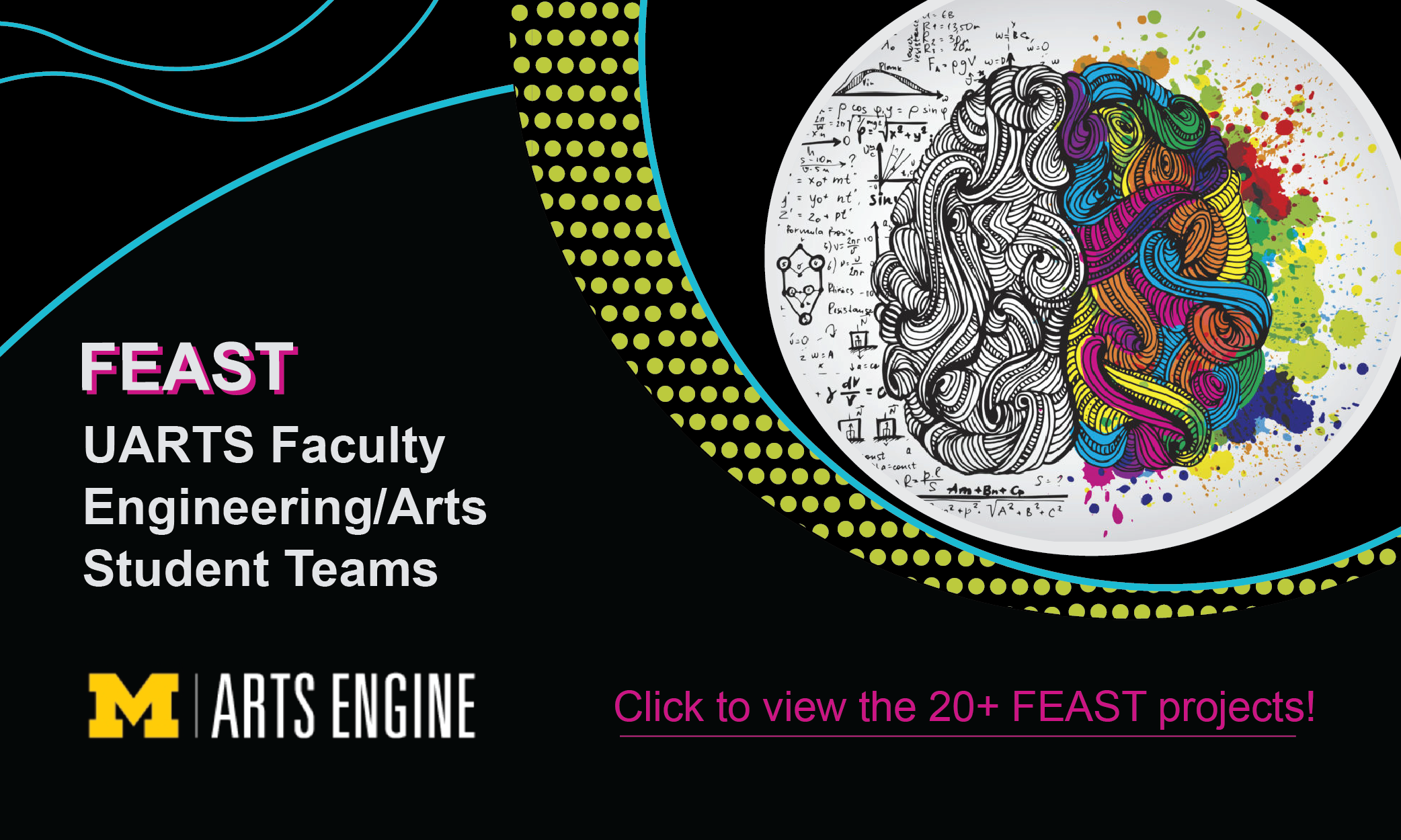UARTS courses
UARTS FEAST projects invite students to engage with North Campus faculty around their research and creative production. Participants will:
- Gain research and creative skills, improve collaborative and team interactions, and engage with meaningful hands-on learning opportunities
- Be a contributing member of a dynamic and ongoing interdisciplinary student team
- Register for and receive curriculum credit every participating semester
- Be able to continue with the project or team over multiple semesters (with faculty permission)
- Develop relationships with faculty and students from outside their school and disciplinary major
Students on FEAST projects may register for UARTS 260, 360, 460, or 560 as appropriate for their enrollment needs and receive 2 credits (additional credit options with faculty approval) for their work.
Want to learn more?
UARTS 150: Writing & Interdisciplinary Collaborative Design
UARTS 150: Writing and Interdisciplinary Collaborative Design is a 4-credit hour writing and project-based course for first-year students who are residents of Living ArtsEngine (engineering students should enroll in ENGIN100.210).
In this course, instructors from five different disciplines will support your exploration of the creative process through a collaborative, semester-long project: a multimodal essay, in the form of a video game, that combines architecture, art & design, engineering, music and writing to make an argument. This project will lead you to explore fascinating processes and questions such as: how can writers, artists, architects, musicians and engineers work together to create interactive experiences? How do makers from all disciplines use research to inform creative work? How can interdisciplinary creative work convey arguments in fun, innovative and meaningful ways? Your work towards this final project will be supported by two additional essays, as well as creative exercises, tutorials, workshops, readings, discussions and research activities that will encourage you to hone existing skills and experiment with unfamiliar disciplines.
This course fulfills the First Year Writing requirement with an emphasis on argument-based writing in a number of modalities and the Engineering 100 requirement for students in the College of Engineering. First Year Writing Requirement courses prepare students for college-level writing across the disciplines. This Living Arts FYWR course emphasizes connections between writing and other forms of making. Like these other creative activities, writing is a process of inquiry; this class will encourage you to cultivate curiosity and ask good questions in order to make genuine discoveries in your written work.
Faculty
- Nathan Byrne, Stamps School of Art & Design – Lead Instructor
- Matthew Thompson, School of Music, Theatre & Dance
- Reche Kirkland, College of Engineering
- Laura Peterson, Taubman College of Architecture and Urban Planning
- Allie Tova-Hirsch, College of Literature Science and Arts – Lead Writing Instructor
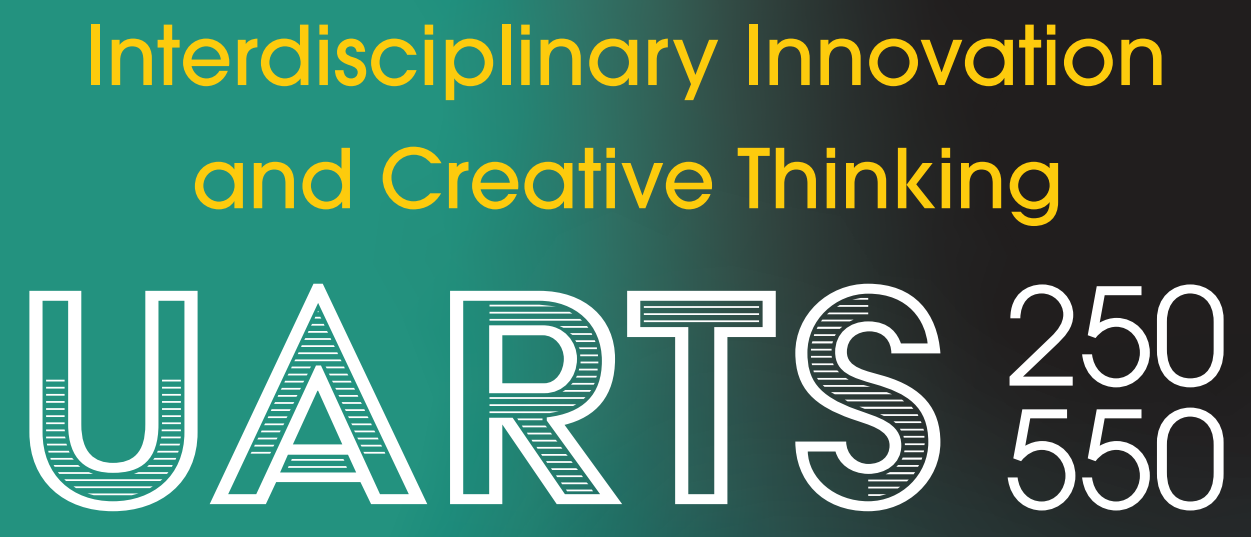
UARTS 250/550: Interdisciplinary Innovation & Creative Thinking
Christopher VoltlUARTS 250/550: Interdisciplinary Innovation and Creative Thinking (I2CT) is a 4-credit course open to U-M undergraduate and graduate students at all levels and in all disciplines.
Students will explore developing meaning, engaging creatively, and achieving unexpected outcomes through discovery with faculty from the North Campus disciplinary ecosystem (architecture, engineering, music, movement/dance, and visual art).
Four smaller projects and a larger, culminating effort allow students to discover how failure, iteration, and experimentation leads to personally embodied and professionally impactful results – joyfully informing and enhancing their disciplinary “major” and their empathetic and creative interactions in the workplace and world.
Students electing lab (102-105) will be auto-enrolled in LEC 100 & DIS 101 (meditation session, which is optional). Most of the class will be conducted synchronously online.
UARTS 250/550 satisfies the LSA Creative Expression requirement; and Intellectual Breadth or Professional or Creative Development Course requirements (for Engineering Students); and counts toward the Entrepreneurship minor.
Faculty
- Stephen Rush, School of Music, Theatre & Dance – Lead Instructor
- Amy Chavasse, School of Music, Theatre & Dance
- Nick Tobier, Stamps School of Art & Design
- Christopher Voltl, Taubman College of Architecture & Urban Planning
- Corbin Reeves, College of Engineering
UARTS 175 & 275: Collaborative Creative Projects
UARTS 175: Collaborative Creative Projects
Teams of Living ArtsEngine students will plan, implement, execute, iterate, and deliver solutions and/or physical prototypes to open-ended interdisciplinary design challenges. Students will present their creative ideas to others and apply feedback they receive to improve their work. A portfolio-style documentation process will be used to log each team’s progress.
Faculty
- Sara “Dari” Eskandari, College of Engineering
- Grace Hsia Haberl, College of Engineering
UARTS 275: Leading Collaborative Creative Projects
Through working with teams of Living ArtsEngine students engaged in project-based activities, peer mentors will study the intellectual underpinnings of interdisciplinary systems and methods of collaboration and design processes, acquire and practice the tools and methods of project management, and develop leadership skills in the management of interdisciplinary creative teams.
Faculty
- Rachel Oti, Living ArtsEngine
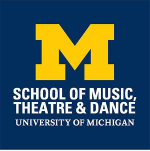
Learn More!
Special Topics courses in interdisciplinary arts allow student the flexibility to pursue discipline-specific or interdisciplinary study in-depth, led by a specialist instructor. The courses will differ thematically, dependent upon the teaching and research expertise of the instructor.
Instructor: Amy Chavasse (SMTD)
Credits: 1.0 – 3.0
Meeting Time: TBA
Location: TBA

Learn More!
Interdisciplinary Collaboration II is a continuation of Interdisciplinary Collaboration I with an emphasis on large-scale multimedia interactive installations.
Instructor: Stephen Rush (SMTD)
Credits: 1.0 – 3.0
Meeting Time: Mondays and Wednesdays, 10:30am-12:30pm
Location: Dance Building, Studio B
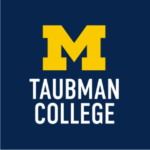
Learn More!
This course provides the opportunity for students draw upon their own disciplinary knowledge and skills from their academic programs as well as their interdisciplinary experience from UARTS coursework to step it up a notch in their professional practice. This course reframes working collaboratively with an interdisciplinary team offering site visits to labs across north campus, guest lectures, and discussions around the topic of interdisciplinary design and practice. Junior/senior standing and graduate standing preferred.
Instructor: Dawn Gilpin (Taubman)
Course: ARCH 409-002/509-019
Credits: 3.0
Meeting Time: Fridays, 9:00am-12:00pm
Location: Bursley Hall Creative Suite (1320)
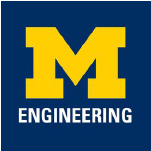
Learn More!
In this experiential course, students learn the skills of socially engaged design during the winter semester, engage in hands-on practice with their teams, and then spend 6-8 weeks during the spring/summer immersed in a field site working with a community partner to identify potential design opportunities.
Instructors: Steven Skerlos
Credits: 6
Meeting Time: TBA
Location: TBA
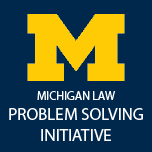
Learn More!
Even pre-pandemic, the U.S. faced a child care crisis. Many parents need child care while they work, insufficient licensed child care programs exist for infants and toddlers, and such programs often cost too much for families. Child care businesses also operate at thin margins and struggle to stay in business due to rising operational costs and challenges finding qualified staff. Multidisciplinary student teams will hear from leading experts and incorporate problem-solving tools and insights from law, social work, policy, business, and other fields to propose solutions to relevant stakeholders.
Instructors: Tifani Sadek (Law), Annette Sobocinski (Child Care Network)
Credits: 3.0
Meeting Time: Wednesdays 3:15-6:30pm

Learn More!
The rise of the cryptoeconomy has implications for national security, data privacy, transaction costs, Web 3.0, and much more. In this class, multidisciplinary student teams will learn about the growth of the cryptoeconomy, varieties of cryptoassets, and an array of potential uses of such assets from experts in law, business, policy, information, and other fields. Students will apply research insights and problem-solving tools to develop a solution focused on regulating the cryptoeconomy.
Instructors: Vikramaditya Khanna (Law), Scott Bauguess (Business)
Credits: 3.0
Meeting Time: Thursdays 3:15-6:30pm

Learn More!
Environmental, Social, and Governance (ESG) policies have taken center stage in the investment world, but requirements of investor ESG policies vary widely, and they may be challenging for investee companies to implement. In this course, multi-disciplinary student teams will work with faculty and subject matter experts to learn about ESG policies, how to assess their impact, and if there are ways to harmonize such policies. Students will leverage problem-solving skills and insights from fields including law, business, and policy to develop innovative solutions to a challenge in this area.
Instructor: David Guenther (Law), Tim Dickinson (Law), David Hess (Business)
Credits: 1.0 – 3.0
Meeting Time: Wednesdays, 3:15-6:30pm

Learn More!
The built environment bears the stamp of slavery supported by new forms of forced labor. Starting with an understanding that architecture isn’t value-neutral and that racism intersects with urban planning, land use, and environmental problems, this class will confront such issues through a U-M/Yale partnership. Students will create a framework for rethinking plantation sites within the National Trust for Historic Preservation’s portfolio, as multidisciplinary teams from law, planning, history, and other fields learn problem-solving skills, conduct research, and approach the politics, ethics, and mechanics of construction holistically.
Instructor: Luis deBaca (Law), Phillip Bernstein (Architecture)
Credits: 3.0
Meeting Time: Wednesdays, 3:15-6:30pm
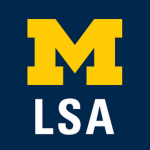
Learn More!
Art, Science, and Technology: The Human Body as an Experiment — This multimedia, interdisciplinary seminar is devoted to exploring the global history and present-day expressions of the relationship between art, science, and technology, and how they are integrated. To this end we will cultivate both a new visual literacy and a new literacy in science and technology.
Instructor: Jennifer Robertson (LS&A)
Credits: 3.0
Meeting Time: Tuesdays and Thursdays, 10:00-11:30am
Location: 180 Tappan Hall, 855 South University Avenue
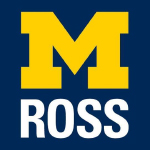
Learn More!
This award-winning course teaches you work skills in ethnography, ecosystem mapping, ideation, prototyping, and business model design, and all of it is focused on designing for resilience to help local small-businesses and nonprofit organizations navigate the pandemic. How can they build back better – reimagine business and social life to be more rewarding, just, and democratic?
Instructors: Jeffrey Sanchez-Burks
Credits: 4.5
Meeting Time: Mondays, 9-11:50am
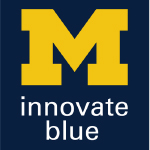
Learn More!
This course explores the relation between creativity, innovation, and problem-solving processes. We will consider the elements of creative thinking, explore insights from a variety of perspectives, and engage in projects designed to foster students’ own creativity and innovation. Is creative thinking somehow different from “normal” thinking? How do innovators frame problems and generate solutions? What is the relation between idea generation and collaborative team work? How do entrepreneurs in business, social goods, and technology develop and employ vital skills in persuasion, cooperation, communication as they bring ideas to life in the form of enterprises? This course will explore all these questions in order to ground students in both the theory and practice of creativity as it takes shape in entrepreneurial endeavors.
Instructor: Eric Fretz (Psychology)
Credits: 3.0
Meeting Time: Mondays and Wednesdays, 1:00-2:00pm, Friday discussions
Location: 140 Lorch Hall, 611 Tappan Street

Learn More!
This discussion course attempts to define what we mean when we say, “creative.” What can scientific research tell us about creativity in terms of individual aptitude and personality, cognitive and brain processes, and social and cultural influences? We will explore the range of theories developed by psychologists and other researchers about the cognitive processes underlying the creative process, including problem definition, idea generation, fixation, incubation, iteration, evaluation, and reflection.
Instructor: Colleen Seifert (Psychology)
Credits: 3.0
Meeting Time: Tuesdays, 3:00-6:00pm
Location: 1060 East Hall, 530 Church Street

Learn More!
*pre-requisite: BBA senior standing*
This course is designed to introduce the student to the practices necessary to stimulate and manage creativity in a business. Students will be given frameworks and methods for designing, developing, and implementing creativity in real work situations. The aim of the course is to provide students with the perspective and skill base necessary to manage creative projects, people and ventures. Each class will consist of two basic components: 1) a theatrical framework, and 2) a methodology or tool. Each segment of the course is designed to engage the student in a conceptual and experiential application of creativity practices that will be applied to a real challenge.
Instructor: Jeff Degraff (Ross)
Credits: 3.0
Meeting Times: Mondays, 9:00am-12:00pm
Location: B3560 Business School

Learn More!
“What tools do I have in my toolbox and how can I use them to make an impact?” This is the central question of The Innovator’s Toolkit. By the end of this course, you will have worked in a team to implement an innovative approach to a complex social problem related to a preselected topic
Instructor: Kenneth Ludwig (CFE)
Credits: 3.0
Meeting Time: Mondays an Wednesdays, 4:00-5:30pm
Location: 1427 Mason Hall, 419 State Street

